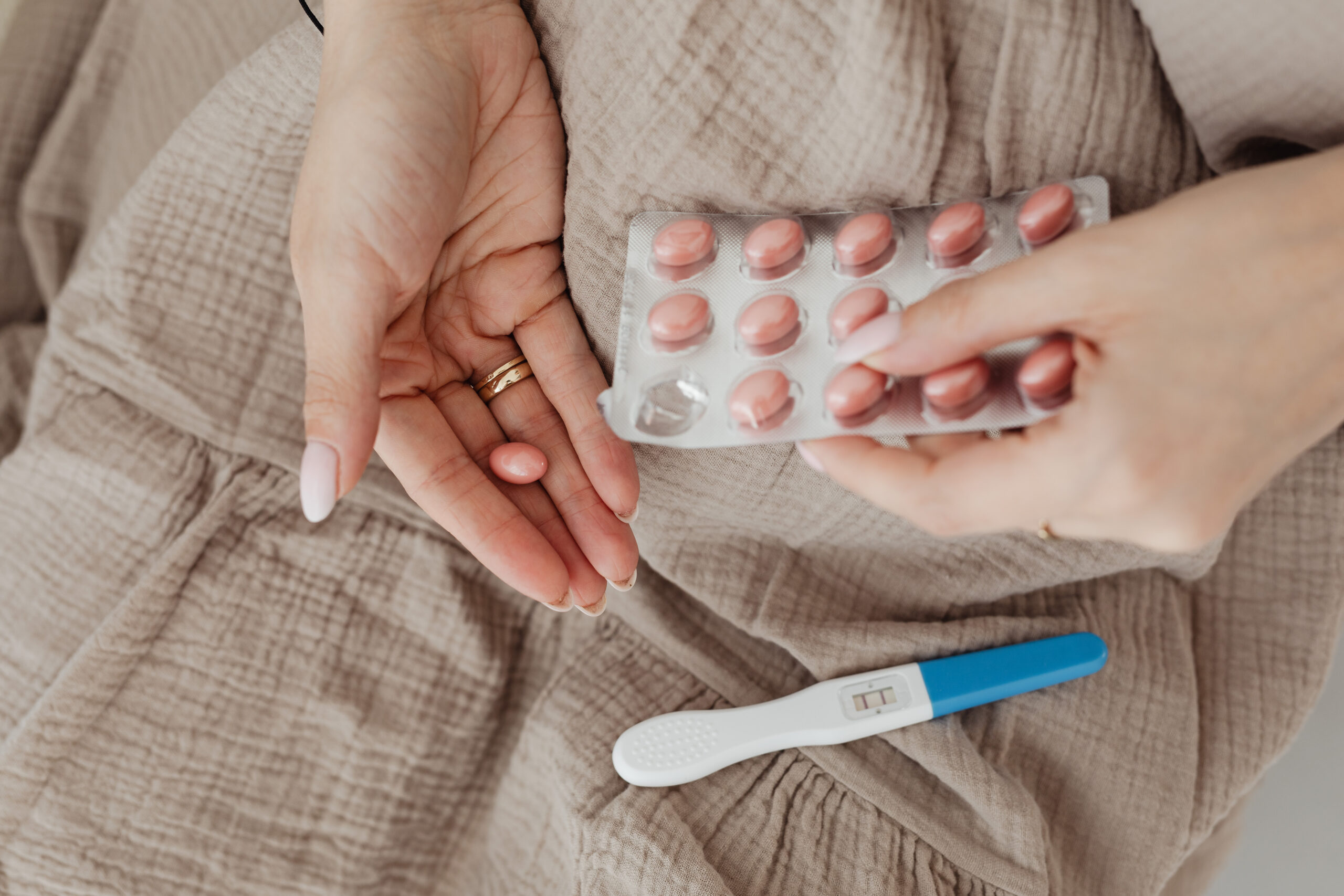The postpartum period is a profound transition—physically, emotionally, and hormonally. As the body recalibrates after pregnancy and childbirth, it’s not uncommon for new mothers to experience unexpected health shifts. One condition that can quietly emerge during this time is postpartum thyroiditis—an often-overlooked thyroid disorder that deserves more attention.
In this article, I’ll explain what postpartum thyroiditis is, why it happens, and how naturopathic care can support long-term healing and resilience during this unique stage of life.
What Is Postpartum Thyroiditis?
Postpartum thyroiditis is an inflammatory condition of the thyroid gland that typically occurs within the first year after giving birth. It is considered autoimmune in nature, meaning the immune system mistakenly attacks the thyroid tissue.
This condition tends to unfold in two distinct phases:
- Hyperthyroid phase: The thyroid becomes overactive, leading to symptoms like irritability, insomnia, rapid weight loss, and palpitations.
- Hypothyroid phase: The thyroid slows down, causing fatigue, low mood, constipation, dry skin, and difficulty losing weight.
Some women experience only one phase; others go through both. For many, thyroid function eventually returns to normal. But for some, particularly those with elevated thyroid antibodies, the condition can evolve into permanent hypothyroidism.
Why Does Postpartum Thyroiditis Happen?
From a naturopathic perspective, postpartum thyroiditis is the result of multiple intersecting factors:
1. Immune Rebound After Pregnancy
During pregnancy, the immune system naturally suppresses itself to tolerate the growing baby. After birth, the immune system reactivates. In some women, this reactivation becomes overzealous, triggering autoimmune responses—including those targeting the thyroid.
2. Nutrient Depletion
Pregnancy and breastfeeding demand a huge amount of nutrients—especially iodine, selenium, zinc, iron, and B vitamins. These nutrients are critical for thyroid hormone production and immune regulation. When stores run low, the thyroid becomes more vulnerable to dysfunction.
3. Hormonal and Emotional Stress
The early postpartum period brings broken sleep, hormonal fluctuations, and often intense emotional stress. All of this affects the HPA axis (hypothalamic-pituitary-adrenal system), which communicates closely with the thyroid. Chronic stress can impair thyroid hormone conversion and fuel inflammation.
4. Genetic and Personal History
Women with a personal or family history of Hashimoto’s thyroiditis, Type 1 Diabetes, or other autoimmune conditions are at higher risk of developing postpartum thyroiditis.
Is It Permanent?
For many women, postpartum thyroiditis is temporary, with thyroid levels returning to normal within 6 to 12 months. However, some women with PPT eventually develop lifelong hypothyroidism, especially if thyroid antibodies (like TPOAb or TgAb) remain elevated.
That’s why early recognition, testing, and holistic support are so important—not just to manage symptoms, but to protect long-term thyroid health.
How to Support Thyroid Health After Birth
Whether you’re recovering from postpartum thyroiditis or aiming to prevent it, naturopathic care focuses on nourishing the body, reducing inflammation, and restoring balance to the endocrine and immune systems.
Here’s where to start:
1. Rebuild Nutrient Reserves
Focus on nutrient-rich, whole foods that specifically support thyroid function:
- Iodine: seaweed, eggs, wild-caught seafood
- Selenium: Brazil nuts (1–2 per day), mushrooms, eggs
- Zinc: grass-fed meat, pumpkin seeds, legumes
- Iron: organ meats, leafy greens, lentils (pair with vitamin C)
- B vitamins: whole grains, eggs, leafy vegetables
- Omega-3s: sardines, salmon, flax and chia seeds
If deficiencies are present (especially postpartum), supplementation may be needed—but always under practitioner supervision, especially while breastfeeding.
2. Support the Nervous System
The thyroid is highly sensitive to stress. Supporting the nervous system helps regulate thyroid hormone conversion and immune activity:
- Prioritise rest and recovery—even short moments of stillness matter.
- Practice breath work, gentle yoga, or mindful movement daily.
- Seek emotional support from your community or a perinatal mental health professional.
3. Balance the Gut-Immune Connection
Your gut and immune system are closely linked. A well-functioning gut can help regulate inflammation and autoimmunity.
- Eat a variety of fibre-rich plant foods.
- Include fermented foods like kefir, sauerkraut, and plain yoghurt.
- Avoid inflammatory foods that don’t agree with your body (commonly gluten or dairy in autoimmune cases, but this varies individually).
4. Test, Don’t Guess
If you’re feeling exhausted, foggy, or emotionally flat postpartum, thyroid testing can help clarify what’s happening. Ask your practitioner to run a full thyroid panel, including:
- TSH
- Free T4
- Free T3
- Thyroid antibodies (TPOAb, TgAb, TRAb)
Tracking these levels over time gives insight into whether your thyroid is healing or needs ongoing support.
Key Herbs to Support Thyroid Function
Herbal medicine can be a powerful ally in supporting postpartum thyroid health—especially when used alongside nutrition and lifestyle changes. As always, herbs should be prescribed by a qualified practitioner to ensure safety and appropriate dosing, particularly when breastfeeding.
Here are four key herbs often used in naturopathic care for thyroid and immune support:
1. Hemidesmus indicus (Indian Sarsaparilla)
Traditionally used in Ayurvedic medicine, Hemidesmus is known for its immune-modulating and anti-inflammatory properties. It may be helpful in autoimmune thyroid conditions like postpartum thyroiditis, where regulating the immune response is critical.
- Supports immune balance without overstimulating the immune system
- Helps cool systemic inflammation
- Often used in combination with other adrenal or thyroid-supportive herbs
2. Rehmannia glutinosa
Rehmannia is a deeply nourishing adaptogenic herb that supports the hypothalamic-pituitary-adrenal (HPA) axis, often disrupted in postpartum women. It’s commonly used in traditional Chinese medicine for both autoimmune conditions and fatigue syndromes.
- Supports thyroid and adrenal resilience
- Helps manage chronic inflammation and autoimmunity
- Often used in formulas for Hashimoto’s thyroiditis or fluctuating thyroid states postpartum
3. Withania somnifera (Ashwagandha)
Withania is one of the most well-known adaptogens, prized for its ability to restore vitality, regulate stress, and support endocrine function.
- Enhances conversion of T4 to T3, the active thyroid hormone
- Supports stress resilience, sleep, and mood
- Safe for many women in the postpartum period, especially during the hypothyroid phase
4. Nigella sativa (Black Seed)
Nigella is gaining attention in research for its anti-inflammatory, antioxidant, and immune-modulating effects—particularly in autoimmune thyroid conditions.
- May help reduce thyroid antibodies in autoimmune thyroiditis
- Supports metabolic health, insulin sensitivity, and inflammation
- Contains thymoquinone, a potent antioxidant with thyroid-protective properties
Final Thoughts
Postpartum thyroiditis is common, underdiagnosed, and often misunderstood. But it is also manageable—and even reversible—with the right care. If you’re feeling off postpartum, trust your instincts. You deserve to feel nourished, balanced, and supported during this deeply transformative time.
As a Naturopath, I believe postpartum care should go far beyond the standard six-week check-up. When we honour the body’s signals and meet them with nourishment, rest, and connection, real healing becomes possible.
If you’d like support navigating your postpartum health or thyroid function, I’m here to help.
Get in touch to book a consultation or learn more about naturopathic postpartum care.




Comments +